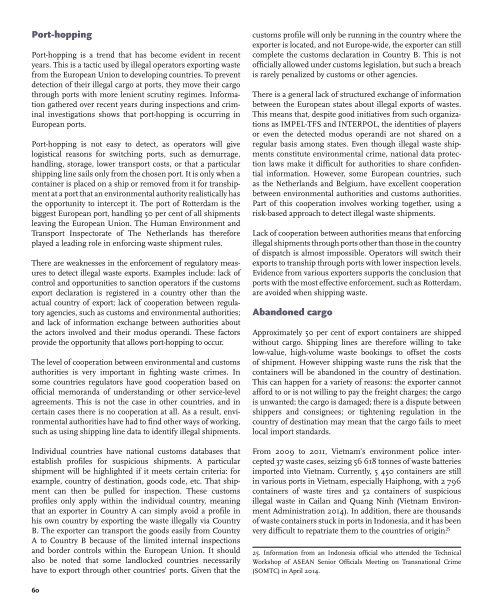WASTE CRIME – WASTE RISKS
6VhhXcA80
6VhhXcA80
Create successful ePaper yourself
Turn your PDF publications into a flip-book with our unique Google optimized e-Paper software.
Port-hopping<br />
Port-hopping is a trend that has become evident in recent<br />
years. This is a tactic used by illegal operators exporting waste<br />
from the European Union to developing countries. To prevent<br />
detection of their illegal cargo at ports, they move their cargo<br />
through ports with more lenient scrutiny regimes. Information<br />
gathered over recent years during inspections and criminal<br />
investigations shows that port-hopping is occurring in<br />
European ports.<br />
Port-hopping is not easy to detect, as operators will give<br />
logistical reasons for switching ports, such as demurrage,<br />
handling, storage, lower transport costs, or that a particular<br />
shipping line sails only from the chosen port. It is only when a<br />
container is placed on a ship or removed from it for transhipment<br />
at a port that an environmental authority realistically has<br />
the opportunity to intercept it. The port of Rotterdam is the<br />
biggest European port, handling 50 per cent of all shipments<br />
leaving the European Union. The Human Environment and<br />
Transport Inspectorate of The Netherlands has therefore<br />
played a leading role in enforcing waste shipment rules.<br />
There are weaknesses in the enforcement of regulatory measures<br />
to detect illegal waste exports. Examples include: lack of<br />
control and opportunities to sanction operators if the customs<br />
export declaration is registered in a country other than the<br />
actual country of export; lack of cooperation between regulatory<br />
agencies, such as customs and environmental authorities;<br />
and lack of information exchange between authorities about<br />
the actors involved and their modus operandi. These factors<br />
provide the opportunity that allows port-hopping to occur.<br />
The level of cooperation between environmental and customs<br />
authorities is very important in fighting waste crimes. In<br />
some countries regulators have good cooperation based on<br />
official memoranda of understanding or other service-level<br />
agreements. This is not the case in other countries, and in<br />
certain cases there is no cooperation at all. As a result, environmental<br />
authorities have had to find other ways of working,<br />
such as using shipping line data to identify illegal shipments.<br />
Individual countries have national customs databases that<br />
establish profiles for suspicious shipments. A particular<br />
shipment will be highlighted if it meets certain criteria: for<br />
example, country of destination, goods code, etc. That shipment<br />
can then be pulled for inspection. These customs<br />
profiles only apply within the individual country, meaning<br />
that an exporter in Country A can simply avoid a profile in<br />
his own country by exporting the waste illegally via Country<br />
B. The exporter can transport the goods easily from Country<br />
A to Country B because of the limited internal inspections<br />
and border controls within the European Union. It should<br />
also be noted that some landlocked countries necessarily<br />
have to export through other countries’ ports. Given that the<br />
customs profile will only be running in the country where the<br />
exporter is located, and not Europe-wide, the exporter can still<br />
complete the customs declaration in Country B. This is not<br />
officially allowed under customs legislation, but such a breach<br />
is rarely penalized by customs or other agencies.<br />
There is a general lack of structured exchange of information<br />
between the European states about illegal exports of wastes.<br />
This means that, despite good initiatives from such organizations<br />
as IMPEL-TFS and INTERPOL, the identities of players<br />
or even the detected modus operandi are not shared on a<br />
regular basis among states. Even though illegal waste shipments<br />
constitute environmental crime, national data protection<br />
laws make it difficult for authorities to share confidential<br />
information. However, some European countries, such<br />
as the Netherlands and Belgium, have excellent cooperation<br />
between environmental authorities and customs authorities.<br />
Part of this cooperation involves working together, using a<br />
risk-based approach to detect illegal waste shipments.<br />
Lack of cooperation between authorities means that enforcing<br />
illegal shipments through ports other than those in the country<br />
of dispatch is almost impossible. Operators will switch their<br />
exports to tranship through ports with lower inspection levels.<br />
Evidence from various exporters supports the conclusion that<br />
ports with the most effective enforcement, such as Rotterdam,<br />
are avoided when shipping waste.<br />
Abandoned cargo<br />
Approximately 50 per cent of export containers are shipped<br />
without cargo. Shipping lines are therefore willing to take<br />
low-value, high-volume waste bookings to offset the costs<br />
of shipment. However shipping waste runs the risk that the<br />
containers will be abandoned in the country of destination.<br />
This can happen for a variety of reasons: the exporter cannot<br />
afford to or is not willing to pay the freight charges; the cargo<br />
is unwanted; the cargo is damaged; there is a dispute between<br />
shippers and consignees; or tightening regulation in the<br />
country of destination may mean that the cargo fails to meet<br />
local import standards.<br />
From 2009 to 2011, Vietnam’s environment police intercepted<br />
37 waste cases, seizing 56 618 tonnes of waste batteries<br />
imported into Vietnam. Currently, 5 450 containers are still<br />
in various ports in Vietnam, especially Haiphong, with 2 796<br />
containers of waste tires and 52 containers of suspicious<br />
illegal waste in Cailan and Quang Ninh (Vietnam Environment<br />
Administration 2014). In addition, there are thousands<br />
of waste containers stuck in ports in Indonesia, and it has been<br />
very difficult to repatriate them to the countries of origin. 25<br />
25. Information from an Indonesia official who attended the Technical<br />
Workshop of ASEAN Senior Officials Meeting on Transnational Crime<br />
(SOMTC) in April 2014.<br />
60


